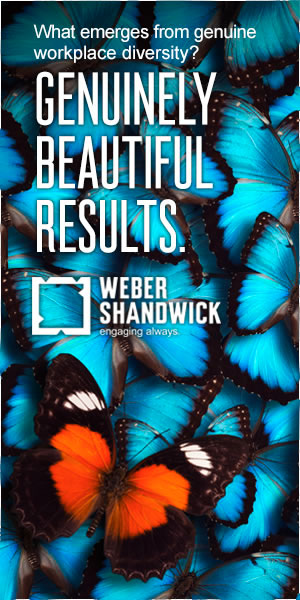Entertainment industry professionals announced the launch of the Blue Fever Streaming Platform, which aims to transcend Hollywood sexism. As an entertainment company, Blue Fever will distribute and eventually produce work from creators including a diverse range. Additionally, blue fever will lead a movement to address the fact that womens stories are only told 15% of the time in mainstream Hollywood.
“Blue Fever will tell women focused stories in bulk allowing BLUE to spread like a fever,” the press release stated.
“There are 850 million millennial women worldwide who are hungry for incredible entertainment made for them,” says Lauren Tracy, CEO of Blue Fever. “So we’re building a platform to house that content.”
This all began when a couple of female filmmakers and a concerned father – the co-founders Lauren Tracy, Greta McAnany and Rick Tracy decided to do something about the male-dominated entertainment industry. The disparity was quite apparent that the need was there as recent research by Polygraph, which reviewed over 2000 screenplays, found that female actors were leads in a mere twenty-two percent of films, while males occupied two of the top three roles a whopping eighty-two percent of the time.
“The data points to an obvious gap. What’s more, it’s a gap the public craves to fill,” the press release explained. “Movies with female protagonists are outperforming male-centric productions in a big way. Top-grossing movies about females made $126.1 million on average from 2006 to 2015.”
That’s an average of $45.5 million (or roughly fifty-six percent) more at the box office than movies about men, which led to the female directors, Tracy and McAnany determining that a modern audience craves entertainment about women because it is different, whether that decision is conscious on the part of the audience or not.
DIVERGE spoke to CEO Lauren Tracy to find out more:
Once you realized there was a need for it, what did you decide to do?
So we began to build a brand around the entertainment they were making with X-Factor Films (now called BLUE FEVER) and hundreds of filmmakers making entertainment about women started to come out of the woodwork. The digital media landscape and the internet (YouTube, Vimeo, Netflix, etc…) have bred the largest pool of high quality filmmakers in history. The problem is, there aren’t enough or enough tailored distribution platforms for audiences to discover the work – there is NO major modern platform for women. Lifetime and OWN are the biggest traditional TV companies but they largely ignores millennial women who hang out online. Even Netflix makes far more movies and series about men than about women. We, the cofounders of Blue Fever saw an opportunity to not only fill a market gap but also an opportunity to change the way the world perceives women through incredible entertainment.
What do you hope to get out of it?
We hope to build a company that competes on a major level with Netflix, Hulu and HBO. The marketing for millennial women in the world is 850 million and digital video consumption among them is growing the fastest.
How will this address sexism in Hollywood?
Blue Fever addresses sexism from outside of Hollywood system. Women have been banging on the gates of Hollywood for over 100 years. It’s not working. The Internet now allows us to build our own ecosystem outside of the system. We are taking the bull by the horns and creating a turnkey service that works directly with hundreds of the best creators of entertainment focused on women and feed it directly to millions of fans. There is no need for traditional Hollywood to “green light” projects. We control the creative and business decisions because we know what’s best for both of parties. We are both creators and fans of this entertainment ourselves.
Why is it important to have diversity in Hollywood?
Having a company that represents the stories of women who represent our world’s diversity makes all our entertainment experiences better. It will make the stories more unique, it will show women and men everywhere what women are capable of on a global scale. Not only is this ethically the way to make art as a corporation, it is more profitable. Hollywood has been leaving money on the table for decades.
Additional Thoughts?
We are an entertainment company first and foremost that will distribute and eventually produce some of the best work from creators working today. But we are also a movement. The name Blue Fever was born from the fact that the color blue is the most common color on Earth, but is notoriously one of them most difficult colors for the human eye to perceive. For thousands of years humans didn’t realize it existed. The Romans thought the sky was white, Homer’s The Odyssey describes the sea as ‘wine dark’ and blue was one of the last pigmented dyes to be produced. We saw an instant connection between the color blue and women. Women are everywhere and nowhere at the same time. We are half the population and yet our stories are told 15% of the time in mainstream Hollywood and we are perceived to be less valuable than men all over the world. Blue Fever will tell women focused stories in bulk allowing BLUE to spread like a fever.
And it is. After announcing bluefevr.com we saw over 10K viral views of our promo video in the first 24 hours and we have seen over 100 submissions of entertainment from independent creators in just a week. Women are responding well with fans saying things like, “I can’t wait to see what’s to come in the new year. Blue Fever is going to change the industry completely. You are doing your part to save the world.“ – Olivia O. And industry people saying things like, “It’s about time someone addresses the unmistakable gender gap in entertainment. Women watch more, spend more and influence more. The data is there….I’m looking forward to watching a data-driven network for me.” – Jesse Draper, Founder and Host of The Valley Girl Show
Who is on the team behind this project?
LAUREN TRACY, CEO of BLUE FEVER – Lauren has written, directed and edited upwards of 20 short films, music videos and corporate videos. As a college student in 2008, Lauren built an organization to bring financial awards to female filmmakers called X-Factor Filmmakers – collaborators included Kathryn Bigelow, NYU and Avid. After speaking at her graduation alongside Zerox CEO Ursula Burns, Lauren spent the next two years editing feature films in Los Angeles. With her idea for a female-driven entertainment studio, she was a 2013 Dogfish Accelerator finalist (the world’s first entertainment business incubator) and accepted to Boston’s leading incubator Venture Development Center in 2014. Lauren’s screenplay SWEET DESERT PALM was a Big Vision Empty Wallet 2015 Lab finalist and she was a finalist director in Lionsgate’s 2015 ‘New Voices of the Twilight Saga’ competition. Now, Blue Fever is growing rapidly with 60 partnered filmmakers and is a 2016 Tech.co Startup of the Year Finalist.
GRETA MCANANY, CO-FOUNDER – Greta graduated from USC in ’10 and immediately produced the feature film BITE SIZE (distributed by BOND360). The film won the Grand Jury prize at Cinequest Film Festival, was featured by Katie Couric on ABC and was distributed on Netflix, Amazon, Vimeo and Pivot TV. Greta is a grant recipient of Morgan Freeman’s Rock River Foundation, Chicken & Egg Pictures and the Thornton Foundation. Greta’s experience has also expanded to producing high-end charity events that have raised hundreds of thousands of dollars. She’s also been a theatre critic for ‘LA Stage Times’, where she interviewed Oscar and Tony-winners. Greta and Lauren met in line at the Sundance Film Festival and realized they shared the common problem of being driven women making content about women in a male dominated industry.
RICK TRACY, Co-founder of X-FACTOR FILMS – A branding expert and film buff, Rick was the Corporate Art Director at Bolt Beranek and Newman for 10 years before starting his own firm Cambridge Design Group (CDG). For over 20 years his firm has been developing brands for new technology companies that have gone on to be acquired by Kodak, Konica Minolta, Covidien and Oxford Instruments. Two brands were acquired for over $55 million each. Other CDG clients include Intel, Dell, Cisco, Microsoft, ARM and Princeton University – From 2008-2011 Rick and Lauren ran an organization called X-Factor Films that provided funding and awards for talented female filmmakers. He is now responsible for all design and branding strategy at Blue Fever.

